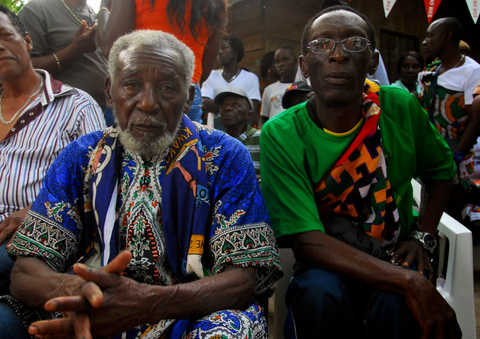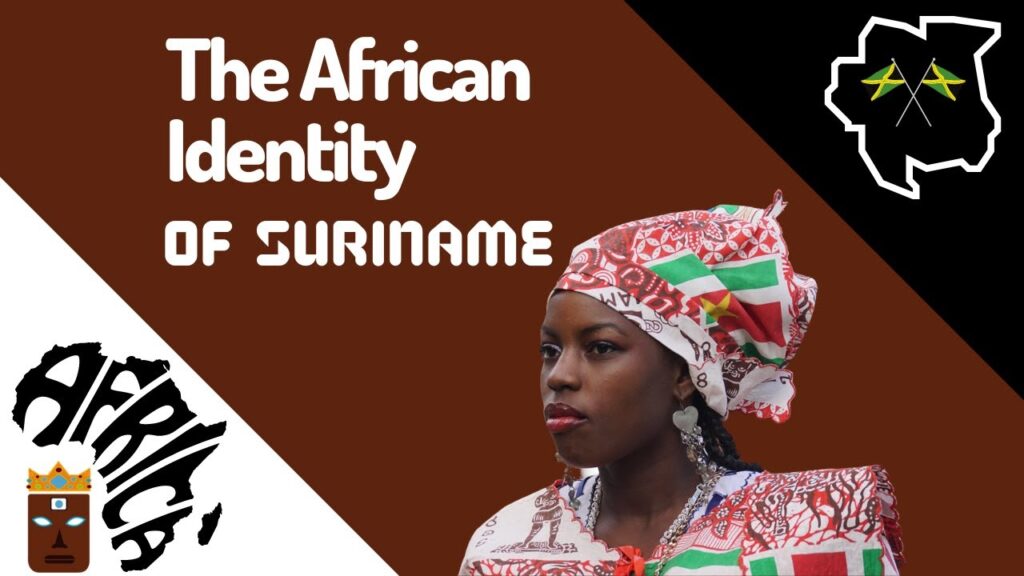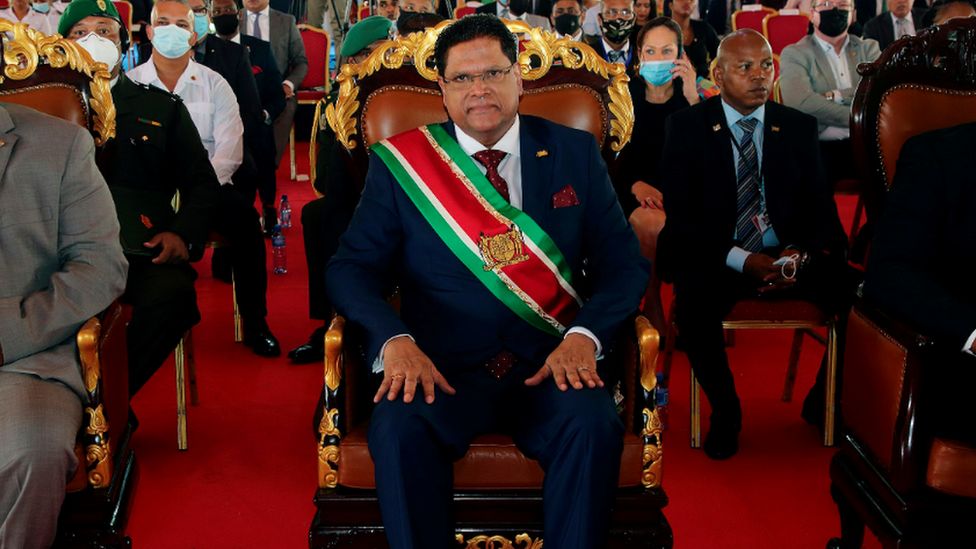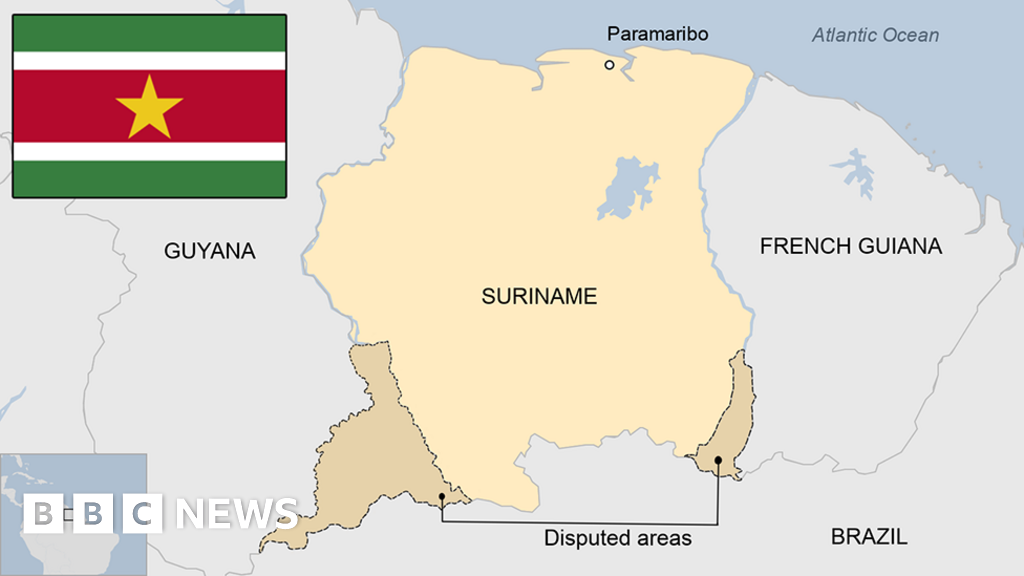So, have you ever wondered about Suriname’s role in Africa? It may not be a country that immediately comes to mind when you think about African affairs, but Suriname actually has a unique and significant connection to the continent. In this article, we’re going to dive deeper into Suriname’s relationship with Africa and explore the various ways in which the country has played a role in African history and culture.
Suriname, a small country located on the northeastern coast of South America, may seem geographically distant from Africa. However, it has a rich history rooted in the transatlantic slave trade, which has shaped its cultural identity and connections to Africa. Suriname was once a Dutch colony, and during the colonial era, thousands of African slaves were brought to Suriname to work on plantations. This history has left a lasting impact on Surinamese culture, with African traditions and languages playing a significant role in the country’s identity.
But Suriname’s connection to Africa didn’t end with the abolition of slavery. Over the years, there have been various cultural exchanges and collaborations between Suriname and African countries. One example of this is Suriname’s participation in the World Festival of Black Arts, held in Senegal in 2010. The festival showcased the diversity and richness of black arts and culture from around the world, and Suriname’s presence highlighted its strong ties to Africa.
In conclusion, Suriname’s role in Africa goes beyond its geographical location. Through its history, culture, and ongoing collaborations, Suriname has maintained a significant connection to the continent. In the upcoming article, we will explore further the specific ways in which Suriname has influenced and been influenced by Africa, providing a deeper understanding of this intriguing relationship. Suriname, a small country located on the northeastern coast of South America, may not come to mind immediately when considering its ties to Africa. However, Suriname has a rich history and a multifaceted role in Africa that spans from historical connections to economic relations, diplomatic engagements, cultural exchanges, educational and healthcare cooperation, environmental conservation, humanitarian aid, sports and recreation, arts and entertainment, agriculture and food security, energy and natural resources, and civil society and women’s empowerment. In this article, we will explore Suriname’s various contributions and partnerships in Africa, highlighting the significance of strengthening the ties between the two regions for mutual growth and development.

Suriname’s Historical Ties to Africa
Transatlantic Slave Trade and Suriname
The history of Suriname is deeply intertwined with the transatlantic slave trade, a tragic chapter that led to the forced migration of millions of Africans to the Americas. Suriname was a Dutch colonial territory known as Dutch Guiana, and it played a significant role in the slave trade, with enslaved Africans being brought to the region to work on plantations.
The Maroon Communities and their African Heritage
Despite the oppressive circumstances endured by the enslaved Africans, many managed to escape and form independent communities known as Maroons. These Maroon communities, such as the Saramaka, Matawai, and Paramaka, preserved their African heritage through their languages, traditions, and cultural practices. The Maroons have contributed to Suriname’s cultural diversity and serve as a reminder of the resilience and strength of African heritage in the country.
African Cultural Influences in Suriname
African cultural influences can be seen throughout Surinamese society, particularly in music, dance, art, cuisine, and religion. Suriname’s traditional music genres, such as Kaseko and Kawina, have roots in African rhythms and melodies. Traditional African instruments, such as drums and shakers, are still utilized in Surinamese music. Additionally, Surinamese cuisine incorporates African flavors and cooking techniques, resulting in dishes that blend African and indigenous influences.
Suriname’s Economic Relations with Africa
Trade and Investment between Suriname and Africa
Suriname has been exploring trade and investment opportunities with various African countries, recognizing the potential for economic cooperation. Both regions have resources and products that can benefit each other. Suriname exports commodities such as gold, bauxite, and agricultural products to Africa, while importing goods like petroleum, machinery, and textiles.
Suriname’s Role in African Development Projects
Suriname has also played a role in African development projects, particularly in the areas of infrastructure, agriculture, and education. Surinamese expertise in infrastructure development has been shared with African countries, contributing to the improvement of transportation networks, including roads and bridges. Suriname’s agricultural knowledge and techniques have been shared through technical exchanges and training programs, promoting food security and sustainable farming practices in African countries. Furthermore, Suriname has provided scholarships to African students, fostering educational cooperation between the two regions.
Bilateral Agreements and Partnerships
Suriname has actively pursued bilateral agreements and partnerships with African countries, aiming to strengthen economic relations and foster mutual development. Through these agreements, both regions benefit from increased trade, investment, technology transfers, and knowledge sharing. By forming strategic alliances, Suriname and African countries can work together to address common challenges and seize opportunities for growth.

Suriname’s Diplomatic Engagement in Africa
Suriname’s Membership in African and Pan-African Organizations
Suriname is committed to active diplomatic engagement with Africa, evident through its membership in various African and pan-African organizations. Suriname is an associate member of the African Union (AU) and has actively participated in AU meetings and initiatives. By being part of these organizations, Suriname contributes to the collective efforts aimed at promoting African unity, peace, and development.
Diplomatic Missions and Relations with African Countries
Suriname’s diplomatic missions in Africa have facilitated strong bilateral relations with several African countries. Diplomatic ties have been established through embassies and consulates, enabling Suriname to engage in mutually beneficial exchanges. These diplomatic relations pave the way for increased cooperation in areas such as trade, investment, education, healthcare, and cultural exchanges.
Contributions to Peacekeeping and Conflict Resolution
Suriname has made valuable contributions to peacekeeping efforts and conflict resolution in Africa. Surinamese troops have participated in United Nations peacekeeping missions, including those in African countries, helping to maintain peace, stability, and security in conflict-affected regions. By actively engaging in peacekeeping endeavors, Suriname demonstrates its commitment to global peace and security.
Suriname’s Cultural Exchanges with Africa
Artistic and Cultural Exchange Programs
Suriname and Africa have engaged in artistic and cultural exchange programs, fostering mutual understanding and appreciation. Artists, musicians, and performers from Suriname have visited Africa, showcasing their talent and allowing for a cultural exchange of ideas and experiences. Similarly, African artists and performers have traveled to Suriname, enriching the local cultural scene and strengthening the ties between the two regions.
African Diaspora Festivals in Suriname
Suriname is home to a vibrant African diaspora, and African heritage is celebrated through festivals and events. Festivals like Keti Koti, which commemorates the abolition of slavery, showcase African traditions, music, dance, and cuisine. These festivals provide an opportunity for Surinamese people to reconnect with their African roots and for visitors to learn about Suriname’s diverse cultural heritage.
Preservation of African Languages and Traditions
Efforts have been made to preserve African languages and traditions in Suriname. Recognizing the importance of cultural preservation, initiatives have been implemented to document and pass down African languages, such as Sranan Tongo, Saramaccan, and Aukan. Traditional African practices, including spiritual rituals and storytelling, are also being preserved and celebrated, contributing to the rich cultural tapestry of Suriname.

Suriname’s Educational and Healthcare Cooperation with Africa
Scholarship Programs and Academic Collaboration
Suriname has established scholarship programs and academic collaborations with African institutions, promoting educational cooperation and knowledge exchange. African students have been granted scholarships to study in Suriname, fostering cultural understanding and academic excellence. Additionally, Surinamese universities and educational institutions have partnered with African counterparts to facilitate collaborative research projects and faculty exchanges.
Medical Professionals Exchanges and Training Programs
Suriname has been actively involved in healthcare cooperation with African countries. Medical professionals from Suriname have traveled to Africa to share their expertise and provide training to local healthcare workers. This exchange of knowledge and resources contributes to the improvement of healthcare systems in African countries, addressing common healthcare challenges and promoting better health outcomes.
Support for African Education and Healthcare Infrastructure
Suriname recognizes the importance of investing in education and healthcare infrastructure in Africa. Development assistance programs have been implemented to support the construction of schools and hospitals, equip them with necessary resources, and provide training for teachers and healthcare professionals. By investing in education and healthcare, Suriname contributes to the overall development and well-being of African communities.
Suriname’s Role in Promoting African Unity and Development
Advocacy for African Interests in International Forums
Suriname actively advocates for African interests in international forums, amplifying the voices of African countries on global platforms. Suriname, as a member of various international organizations, including the United Nations, strives to ensure that African perspectives and priorities are heard and taken into consideration in decision-making processes. By championing African causes, Suriname seeks to promote African unity, development, and self-determination.
Promoting African Integration and Cooperation Initiatives
Suriname supports African integration and cooperation initiatives aimed at fostering economic growth and regional stability. The country recognizes the importance of regional organizations, such as the Economic Community of West African States (ECOWAS) and the Southern African Development Community (SADC), in advancing African development agendas. Suriname actively engages with these regional bodies, offering its expertise and contributing to regional initiatives.
Participation in Global Partnerships for African Development
Suriname participates in global partnerships focused on African development, such as the African Development Bank and the New Partnership for Africa’s Development (NEPAD). Through these partnerships, Suriname joins other countries and organizations in providing financial resources, technical assistance, and capacity building support to African countries. By working together, these partnerships aim to promote sustainable and inclusive development in Africa.

Suriname’s Contribution to African Environmental Conservation
Collaboration on Sustainable Development and Climate Change
Suriname collaborates with African countries on sustainable development and climate change initiatives. Both regions face environmental challenges, including deforestation, habitat loss, and climate change impacts. Suriname actively shares its experiences and knowledge in sustainable forestry and biodiversity conservation, contributing to the preservation of Africa’s natural resources and the mitigation of climate change effects.
Protection and Restoration of Natural Resources in Africa
Suriname recognizes the importance of protecting and restoring natural resources in Africa. Through collaboration with African countries, Suriname supports initiatives related to forest protection, wildlife conservation, and sustainable land management. These efforts aim to safeguard Africa’s natural heritage and promote sustainable and responsible resource utilization for the benefit of current and future generations.
Sharing of Ecological Knowledge and Best Practices
Suriname’s rich biodiversity and pristine ecosystems provide a valuable knowledge base for African countries. Suriname actively shares its ecological knowledge and best practices with African nations through technical exchanges, training programs, and research collaborations. This knowledge sharing facilitates the adoption of sustainable practices and the conservation of biodiversity, contributing to the long-term ecological and economic well-being of African countries.
Suriname’s Engagement in African Humanitarian Aid
Support for Refugees and Internally Displaced Persons in Africa
Suriname has provided support for refugees and internally displaced persons (IDPs) in Africa, recognizing the importance of addressing humanitarian crises. Through financial contributions and collaboration with international organizations, Suriname strives to alleviate the suffering of displaced populations and promote their well-being. This support includes access to basic necessities, healthcare services, and educational opportunities for refugee children.
Emergency Relief Efforts and Humanitarian Partnerships
Suriname actively engages in emergency relief efforts and humanitarian partnerships in Africa. When disasters occur, such as natural disasters or conflicts, Suriname provides financial aid, relief supplies, and technical assistance to affected communities. Additionally, Suriname collaborates with humanitarian organizations to deliver aid and promote long-term solutions for vulnerable populations in Africa.
Capacity Building and Skills Training Programs
Suriname recognizes the importance of capacity building and skills training in promoting sustainable development and self-reliance in Africa. Suriname has implemented programs to provide vocational training and empower African communities with the necessary skills for economic independence. By investing in capacity building, Suriname contributes to poverty alleviation and socio-economic development in African countries.

Suriname’s Role in African Sports and Recreation
Participation in African Sports Competitions
Surinamese athletes have participated in African sports competitions, fostering cultural exchange and sports diplomacy between Suriname and African countries. Suriname’s athletes have competed in various sports, including football, athletics, and martial arts. These sporting events offer an opportunity for Suriname to showcase its talent and build bridges of friendship through the universal language of sports.
Coaching and Training Programs for African Athletes
Suriname has provided coaching and training programs for African athletes, contributing to the development of sports talent in Africa. Surinamese coaches and trainers have shared their expertise in various sports disciplines, assisting African athletes in reaching their full potential. This sports cooperation enhances sporting capabilities, promotes fair play, and strengthens the bonds between Suriname and Africa.
Sports Infrastructure Development Projects in Africa
Suriname has supported sports infrastructure development projects in Africa, recognizing the importance of well-equipped facilities for athletic training and competitions. Through financial assistance and technical expertise, Suriname contributes to the construction and improvement of stadiums, sports complexes, and training centers in African countries. These infrastructure projects create opportunities for athletes and promote sports development at the grassroots level.
Suriname’s Role in African Arts and Entertainment
Promotion of African Artists and Performers
Suriname actively promotes African artists and performers, providing platforms for their work to be showcased and appreciated. Cultural events, such as music festivals, art exhibitions, and theater performances, feature African artists, allowing Surinamese audiences to experience the richness of African arts and culture. This promotion of African talents fosters cultural exchange and mutual understanding between Suriname and Africa.
Cultural Festivals and Exhibitions Showcasing African Arts
Suriname hosts cultural festivals and exhibitions that showcase African arts and crafts. These events provide a space for African artisans to exhibit their work and share their cultural heritage with Surinamese and international visitors. By celebrating African arts, Suriname highlights the diversity and creativity of African cultures, promoting intercultural dialogue and appreciation.
Tourism and African Heritage Sites
Suriname’s African heritage sites, such as the historic inner city of Paramaribo, have attracted tourists interested in African history and culture. The UNESCO World Heritage-listed city, with its colonial architecture and diverse cultural influences, reflects the country’s African, European, and indigenous heritage. Suriname’s efforts to preserve and promote African heritage sites contribute to cultural tourism and promote a better understanding of African history and contributions.
Suriname’s Cooperation in Agriculture and Food Security in Africa
Technological Exchanges and Agricultural Research Collaboration
Suriname has engaged in technological exchanges and agricultural research collaboration with African countries, aiming to enhance food security and agricultural productivity. Suriname’s experience in tropical agriculture, including crop cultivation and livestock management, is shared with African farmers through technical assistance programs and research partnerships. This collaboration contributes to improved farming techniques, increased agricultural yields, and better food security in Africa.
Capacity Building and Training Programs for Farmers
Capacity building and training programs for farmers in Africa have been implemented with Surinamese support. These programs aim to enhance farmers’ knowledge and skills in sustainable farming practices, soil conservation, and post-harvest management. By empowering African farmers with technical expertise, Suriname contributes to the development of resilient agricultural systems and improved livelihoods.
Support for Agricultural Infrastructure and Food Distribution Projects
Suriname recognizes the importance of investing in agricultural infrastructure and efficient food distribution systems in Africa. Through development assistance programs, Suriname supports the construction and improvement of irrigation systems, storage facilities, and transportation networks. By bolstering agricultural infrastructure, Suriname contributes to reducing post-harvest losses, improving market access, and enhancing food security in African countries.
Suriname’s Partnership in African Energy and Natural Resources
Investment and Collaboration in African Oil, Gas, and Mining Sectors
Suriname has invested in and collaborated with African countries in the oil, gas, and mining sectors. Suriname’s expertise in these industries allows for knowledge exchange and technology transfer, promoting responsible resource extraction and management practices. By working together, Suriname and African countries can maximize the potential benefits of their natural resources while minimizing environmental and social impacts.
Renewable Energy Development Projects in Africa
Recognizing the potential for renewable energy in Africa, Suriname has supported and implemented renewable energy development projects in collaboration with African countries. Suriname’s experience in hydropower and biomass energy production is shared with African nations, aiding in the transition towards a more sustainable energy mix. This renewable energy cooperation contributes to reducing greenhouse gas emissions and mitigating the impacts of climate change.
Sustainable Management of Natural Resources
Suriname actively engages in discussions and initiatives focused on the sustainable management of natural resources in Africa. Suriname advocates for responsible resource extraction practices, including the protection of biodiversity, land rights, and the rights of indigenous communities. By sharing its experiences and participating in global dialogues, Suriname contributes to the formulation of policies and practices that ensure the long-term sustainability of Africa’s natural resources.
Suriname’s Role in Civil Society and Women’s Empowerment in Africa
Support for Women-Led Initiatives in Africa
Suriname supports women-led initiatives in Africa, recognizing the importance of gender equality and the empowerment of women. Through financial contributions and technical assistance, Suriname assists in the establishment and growth of women’s organizations and initiatives that promote women’s rights, entrepreneurship, economic independence, and leadership. This support contributes to the advancement of women’s rights and gender equality in African societies.
Promoting Gender Equality and Women’s Rights
Suriname actively promotes gender equality and women’s rights in Africa, advocating for policy reforms and social change. Suriname engages in dialogue with African governments, civil society organizations, and international entities to address gender-based discrimination, violence against women, and barriers to women’s empowerment. By proactively championing gender equality, Suriname contributes to the overall well-being and development of African women and communities.
Civil Society Collaboration and Exchange Programs
Suriname collaborates with African civil society organizations, fostering partnerships and knowledge exchange on various social issues. By sharing experiences and best practices, Suriname and African civil society organizations can learn from each other and work together in addressing challenges such as poverty, education, healthcare, and human rights. This civil society collaboration strengthens the ties between Suriname and Africa, creating avenues for joint advocacy and collective action.
Conclusion
Suriname’s multifaceted role in Africa underscores the depth of its connections and commitments to the continent. From historical ties to cultural exchanges, economic relations to diplomatic engagements, educational collaborations to environmental conservation efforts, Suriname’s contributions to Africa are diverse and essential for mutual growth and development. By strengthening ties and fostering partnerships, Suriname and Africa can continue working together to address common challenges, promote sustainable development, and create a brighter future for both regions. The significance of Suriname’s role in Africa cannot be overstated, and continued cooperation will undoubtedly lead to mutually beneficial outcomes.